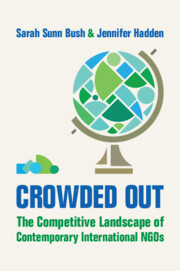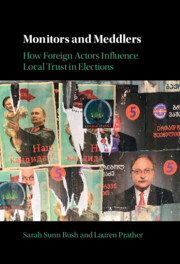Refine search
Actions for selected content:
38 results
The End of Autocratic Norm Adaptation? US Retrenchment and Liberal Norms in Illiberal Regimes
-
- Journal:
- International Organization / Volume 79 / Issue S1 / December 2025
- Published online by Cambridge University Press:
- 20 November 2025, pp. S224-S241
- Print publication:
- December 2025
-
- Article
-
- You have access
- Open access
- HTML
- Export citation
Pushing Back or Backing Down? Evidence on Donor Responses to Restrictive NGO Legislation
-
- Journal:
- International Organization , First View
- Published online by Cambridge University Press:
- 05 November 2025, pp. 1-28
-
- Article
- Export citation

Crowded Out
- The Competitive Landscape of Contemporary International NGOs
-
- Published online:
- 24 May 2025
- Print publication:
- 15 May 2025
-
- Book
-
- You have access
- Open access
- Export citation
3 - After the INGO Explosion
-
- Book:
- Crowded Out
- Published online:
- 24 May 2025
- Print publication:
- 15 May 2025, pp 51-84
-
- Chapter
-
- You have access
- Open access
- Export citation
9 - Public Diplomacy
-
-
- Book:
- Diplomatic Tradecraft
- Published online:
- 15 March 2024
- Print publication:
- 28 March 2024, pp 197-220
-
- Chapter
- Export citation
Stay off my field: policing boundaries in human rights and democracy promotion
-
- Journal:
- International Theory / Volume 15 / Issue 2 / July 2023
- Published online by Cambridge University Press:
- 23 January 2023, pp. 263-290
-
- Article
-
- You have access
- Open access
- HTML
- Export citation
6 - Intervener Identity
-
- Book:
- Monitors and Meddlers
- Published online:
- 28 July 2022
- Print publication:
- 11 August 2022, pp 177-210
-
- Chapter
- Export citation
2 - How Foreign Actors Influence Election Credibility
-
- Book:
- Monitors and Meddlers
- Published online:
- 28 July 2022
- Print publication:
- 11 August 2022, pp 33-69
-
- Chapter
- Export citation
8 - Elections with Foreign Influences
-
- Book:
- Monitors and Meddlers
- Published online:
- 28 July 2022
- Print publication:
- 11 August 2022, pp 247-274
-
- Chapter
- Export citation
1 - Introduction
-
- Book:
- Monitors and Meddlers
- Published online:
- 28 July 2022
- Print publication:
- 11 August 2022, pp 1-32
-
- Chapter
- Export citation
4 - Monitors’ Effects
-
- Book:
- Monitors and Meddlers
- Published online:
- 28 July 2022
- Print publication:
- 11 August 2022, pp 97-135
-
- Chapter
- Export citation

Monitors and Meddlers
- How Foreign Actors Influence Local Trust in Elections
-
- Published online:
- 28 July 2022
- Print publication:
- 11 August 2022
5 - Democracy and the Quality of Democracy: The Never-Ending Quest
- from Part II - Problems of Democracy in a Democratic Age
-
- Book:
- Latin American Politics and Society
- Published online:
- 11 June 2022
- Print publication:
- 09 June 2022, pp 165-200
-
- Chapter
- Export citation
1 - Introduction
- from Part I - Introduction and Argument
-
- Book:
- Marketing Democracy
- Published online:
- 24 March 2022
- Print publication:
- 31 March 2022, pp 3-25
-
- Chapter
- Export citation
3 - Ideas and the Institutional Architecture of Democracy Aid
- from Part II - Marketing Democracy
-
- Book:
- Marketing Democracy
- Published online:
- 24 March 2022
- Print publication:
- 31 March 2022, pp 55-97
-
- Chapter
- Export citation
6 - The Politics of Democracy Aid after the Arab Uprisings
- from Part III - Securing Democracy
-
- Book:
- Marketing Democracy
- Published online:
- 24 March 2022
- Print publication:
- 31 March 2022, pp 181-201
-
- Chapter
- Export citation
2 - A Political Economy of Democracy Aid
- from Part I - Introduction and Argument
-
- Book:
- Marketing Democracy
- Published online:
- 24 March 2022
- Print publication:
- 31 March 2022, pp 26-52
-
- Chapter
- Export citation

Marketing Democracy
- The Political Economy of Democracy Aid in the Middle East
-
- Published online:
- 24 March 2022
- Print publication:
- 31 March 2022
5 - The Iraq War
-
- Book:
- America's Wars
- Published online:
- 16 December 2021
- Print publication:
- 20 January 2022, pp 135-175
-
- Chapter
- Export citation
Disaggregating democracy aid to explain peaceful democratisation after civil wars
-
- Journal:
- European Journal of International Security / Volume 7 / Issue 2 / May 2022
- Published online by Cambridge University Press:
- 17 December 2021, pp. 164-188
-
- Article
-
- You have access
- Open access
- HTML
- Export citation
